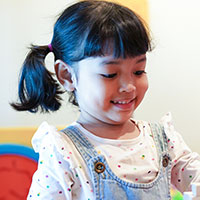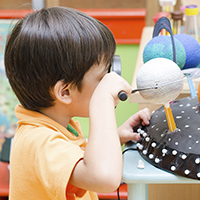At Excel Learning Centers (ELCs), we strive to develop trust with families and grow students into successful adults and role models for the next generation. As such, ELCs utilize the unified Creative Curriculum™ which offers a variety of educational activities specifically designed for your child’s individual age group. We also believe that children learn best through play and employ similar opportunities (e.g., dramatic play, playground time, puzzles, manipulatives) to focus on the whole child and strengthen each domain within.
ELCs offer programs for four distinct age groups: infant/toddler, preschool, NC Pre-K/Head Start and elementary. Throughout our programs, we teach children respect for others and their feelings; instruct on other cultures and ways of life; promote language skills, courtesy, patience, thanksgiving, and health practices; and encourage life long learning. ELCs also utilize a childcare app to give parents and caregivers a real-time peek into their child’s day. Stay connected by receiving updates about naps, meals, play, and learning activities via web, email, or text message, or communicate with teachers via web, mobile device, or smartphone.

Offering a strong start for babies, our ELC caregivers provide comfort, predictability and a nurturing environment. Babies develop their own schedules, so we make sure to follow their leads so they’re relaxed, supported, and engaged for these earliest days of learning.

Full of energy and curiosity, our toddlers learn through everyday routines. The beginnings of independence, friendships, and skills-building are on full display, so our educators focus such inquisitiveness toward learning early language, math, science and other key building blocks.

Ninety percent of a child’s brain is developed by age five! That’s why preschool—with critically important cognitive, physical, and socio-emotional stimulation—impacts a child’s development long-term. Preschool helps produce:
ELCs’ preschool program encourages these animated, imaginative three- to five-year-olds to think, connect, explore, question and learn well. This includes solving problems, resolving conflicts, playing cooperatively and developing independence.

ELCs offer two different state-funded programs that support kids toward school readiness: North Carolina Pre-Kindergarten and Head Start.

(4 years old to 5 years old)
This option is a great in-between step for students who:
Offered at Excel locations 2 (17th Street, Wilmington) and 4 (601 N. 35th, Morehead), the Junior Inspectors Classroom focuses on math, science, early literacy, writing and social skills to prepare children for Kindergarten—and the rest of their schooling career. Students in the Junior Inspectors Classroom will:

ELCs offer a safe, organized, and supervised environment for school-aged students that takes a child-initiated, child-led approach to learning. This means children get to challenge and extend their thinking (and others’) to create new knowledge in collaborative interactions.

Excel Summer Camp is an exciting adventure of activities, field trips, special visitors, and much more all summer long!
From our tiniest infant campers to our more seasoned school age campers, we provide full day programming in a fun camp-like setting to keep children engaged and active!
Enroll your child in one of our summer programs for the perfect combination of physical activity and learning opportunities such as: